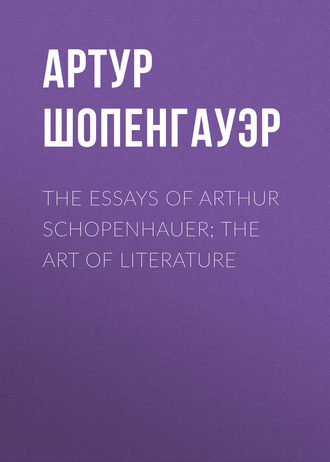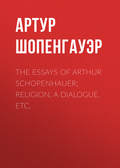
Артур Шопенгауэр
The Essays of Arthur Schopenhauer; The Art of Literature
Responsura tuo nunquam est par fama labori.
Nor, again, is it exactly the pleasure it gives you; for this is almost outweighed by the greatness of the effort. It is rather a peculiar kind of instinct, which drives the man of genius to give permanent form to what he sees and feels, without being conscious of any further motive. It works, in the main, by a necessity similar to that which makes a tree bear its fruit; and no external condition is needed but the ground upon which it is to thrive.
On a closer examination, it seems as though, in the case of a genius, the will to live, which is the spirit of the human species, were conscious of having, by some rare chance, and for a brief period, attained a greater clearness of vision, and were now trying to secure it, or at least the outcome of it, for the whole species, to which the individual genius in his inmost being belongs; so that the light which he sheds about him may pierce the darkness and dullness of ordinary human consciousness and there produce some good effect.
Arising in some such way, this instinct drives the genius to carry his work to completion, without thinking of reward or applause or sympathy; to leave all care for his own personal welfare; to make his life one of industrious solitude, and to strain his faculties to the utmost. He thus comes to think more about posterity than about contemporaries; because, while the latter can only lead him astray, posterity forms the majority of the species, and time will gradually bring the discerning few who can appreciate him. Meanwhile it is with him as with the artist described by Goethe; he has no princely patron to prize his talents, no friend to rejoice with him:
Ein Fürst der die Talente schätzt, Ein Freund, der sich mit mir ergötzt, Die haben leider mir gefehlt.
His work is, as it were, a sacred object and the true fruit of his life, and his aim in storing it away for a more discerning posterity will be to make it the property of mankind. An aim like this far surpasses all others, and for it he wears the crown of thorns which is one day to bloom into a wreath of laurel. All his powers are concentrated in the effort to complete and secure his work; just as the insect, in the last stage of its development, uses its whole strength on behalf of a brood it will never live to see; it puts its eggs in some place of safety, where, as it well knows, the young will one day find life and nourishment, and then dies in confidence.







